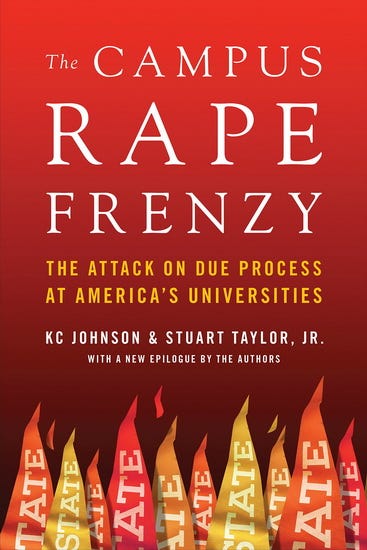Accused Men on Campus Are Up Against Decades of Feminist Myth-Making
Even Foremost Expert on Campus Due Process Violations Cannot Resist Replaying Feminist Talking Points
At the end of a hair-raising book about miscarriages of justice for young men accused of campus sexual misconduct (The Campus Rape Frenzy, co-written with Professor of History K.C. Johnson), Stuart Taylor Jr. wrote the following warning for parents to give to their sons:
"You should of course treat women with respect; avoid making unwanted sexual overtures; and be quick to help the victim of any apparent assault, sexual or otherwise. What may be less obvious is that - just as women in college face grave dangers from rapists and other sexual predators - men like you face grave dangers from false accusers who have been misled by colleges and activists [feminists]. They have been propagandized and lobbied to believe that they should make claims against you whenever they end up unhappy about sexual contact, even if it was clearly consensual. You also face danger from egregiously unfair disciplinary processes and from campus sex bureaucrats who are, in many cases, extremely biased against males [Title IX offices]. For this reason, be aware that any fellow student with whom you have sexual contact may have the power to get you expelled for sexual assault if she feels regret or becomes angry with you an hour, a day, a month a year, or even two years later. Casual sex with someone you barely know is especially dangerous." (The Campus Rape Frenzy, 268-269)
I respect Taylor for offering the template—and even more for putting years of his life into much-needed research on the abuse of rape statistics and disciplinary policies—but I also marvel at how difficult it has become to write the brutal truth about male-female sexual relationships under feminist jurisdiction.
First published five years ago, Taylor’s statement addresses a situation that remains relatively unchanged. It is still quite possible for an allegation of sexual misconduct, made without any proof and even in the face of countervailing evidence, to completely derail a male student’s life, causing his expulsion from the university, the smashing of his career plans, and the ruination of his reputation, potentially permanently.
Modest attempts at amelioration of tribunal proceedings by Betsy De Vos, Trump’s Education Secretary, have been ignored by most universities and were among the first policies Joe Biden promised to reverse when he took office.
Taylor’s statement speaks eloquently to the unfairness of sexual misconduct tribunals, most of which are staffed by feminist ideologues, employ the lowest possible standard of evidence, and deny accused men fundamental due process protections.
And yet still his warning is couched in feminist myths.
Let’s start with a few relatively small matters. “Treat women with respect.” No. Treat one’s dates and female friends with courtesy and civility. But “Treat women with respect,” not unlike “Start by believing,” is a feminist mantra suggesting that women are owed something by virtue of their sex and their alleged past history of victimization, two related beliefs that underpin almost all feminist policy-making and sloganeering. Respect is to be earned, not automatically granted; and unfortunately, as Taylor’s research has shown, it is the last thing that a significant minority of college women today deserve. “Treat yourself with respect” would be better.
“Avoid making unwanted sexual overtures.” Another feminist dodge. In an era in which men are still expected to make the first move in most romantic situations and in which a “sexual overture” could include trying to get a girl’s attention or pursuing her for a date, this piece of advice wrongly implies that false allegations are something that men can control, and that men can tell when an overture is “unwanted.” In fact, no man sets out to make an “unwanted” advance. The problem with sexual misconduct tribunals, and with our cultural attitudes generally, is that sexual harassment is defined extremely broadly, with no obligation placed on the woman to communicate clearly. Nearly anything can be classified, after the fact, as “unwanted.”
“Be quick to help the victim of any apparent assault, sexual or otherwise.” No way. True, it’s not clear what is meant by “help.” If it means calling campus security or alerting other appropriate authorities, fine. If it means intervening personally, it’s an extremely reckless recommendation that no parent should make to their son: depending on the circumstances, it’s a good way for the young man to end up with a punch to the face or something worse.
Now for the more profound misrepresentations in the advice:
“Women in college face grave dangers from rapists and other sexual predators.” Untrue. Every reputable survey, including many quoted in Johnson and Taylor’s own book (see, for one example, 43-44), shows that college campuses are extremely safe places for women and that most encounters classified as sexual assaults are actually something else: non-consensual sex influenced by excessive alcohol and other forms of inebriation.
“Just as women in college face grave dangers from rapists and other sexual predators, men like you face grave dangers from false accusers.” This is a false equivalence. There is no parallel between the situation faced by an accused man—in which case he will probably be left friendless to repair, if he possibly can, his shattered career prospects and reputation—and that faced by his accuser, for whom a multiplicity of support services, assistance, accommodations, and abundant public sympathy exist and who will never be denied opportunities (quite the opposite) because of her experience.
“Any fellow student with whom you have sexual contact may have the power to get you expelled […] Casual sex with someone you barely know is especially dangerous.” Somewhat misleading. I’ll assume that Taylor has the research to prove that casual encounters are the ones most likely to lead to a false allegation; but the encounter certainly need not be casual. Men have famously found themselves accused at the conclusion of tender long-term relationships. It all depends on the woman and her motivation to cause trouble. Furthermore, men have found themselves accused by women they never touched. Once again, the advice suggests that men can protect themselves through their own actions when the reality is that although some men may be able to reduce the likelihood of being accused, the system has been so thoroughly corrupted by feminist ideology that no man is safe.
I suspect that Taylor knows the above to be the case, but can’t say so. It’s too depressing, too “extremist,” too much like something a men’s rights activist would say. And he is emphatically not a men’s rights activist.
Taylor and Johnson are careful to make clear in their Introduction that they both voted (twice!) for the U.S. president who implemented and enforced the policies they object to (11). They voted for him even after he made it clear that the policies they object to were a key part of his presidency. In other words, they are good men, liberals, supporters of women. They also state that “alleged victims deserve to be believed—unless evidence suggests otherwise” (9), a statement that, at least at the personal level, neatly reverses presumption of innocence.
I find this chilling. When even the author who spent over a decade investigating innocent men “branded as sex criminals” (11) cannot jettison obeisance to feminist myths, we know we are in very deep trouble. However angry the tribunal system seems to have made Stuart Taylor, it wasn’t enough to turn him—or many others like him—against the system’s founding ideology.








Have you read 'Witches, Feminism and The Fall of The West' by Edward Dutton? Some eye opening stuff in that book. I highly recommend.
Appreciate the precision of your always welcome analysis!